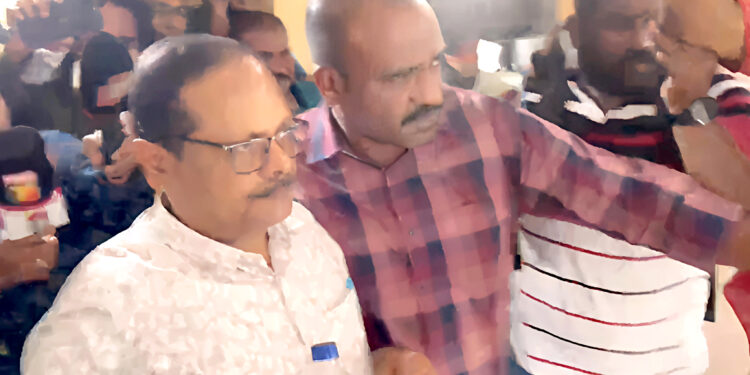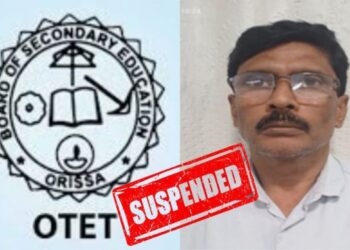The Odisha Teacher Eligibility Test (OTET) paper leak case has taken a dramatic turn with the arrest of Nihar Ranjan Mohanty, Vice-President of the Board of Secondary Education (BSE), by the Crime Branch. This brings the total number of arrests in the case to eight, highlighting serious lapses in the board’s examination system.
The scandal erupted when the OTET question paper was leaked on the night of July 19, just a day before the scheduled exam on July 20. The leak prompted the BSE to cancel the examination, sparking widespread outrage. Investigations revealed that the leaked paper originated from Mohanty’s laptop, raising questions about the board’s protocols and oversight.
According to Crime Branch DIG Binaytosh Mishra, Mohanty had a close connection with the prime accused, Jiten Maharana, a data entry operator at the BSE office. Evidence shows Mohanty communicated with Maharana over 100 times via phone outside office hours, despite Maharana having no official role in exam management. Mohanty, who had access to the question paper’s password for verification purposes, allegedly failed to delete the file from his laptop after review, as required. Instead, he allowed Maharana to access his laptop, facilitating the leak.
The investigation further exposed procedural irregularities. Contrary to BSE regulations, the question paper was sent to Mohanty’s laptop via email instead of the secure File Transfer Protocol (FTP). This breach violated the board’s confidentiality protocols, which mandate that question papers be handled solely by the board’s secretary.
The discovery that Mohanty’s daughter-in-law and the wife of an academic officer were included in the question-setting panel has further fueled allegations of nepotism and rule violations.
The Crime Branch’s probe, which intensified after multiple raids, continues to investigate potential financial dealings linked to the leak. Seven others were arrested earlier, including Maharana, who is believed to have played a central role.
The incident has cast a shadow over the BSE’s credibility, with critics questioning how such lapses persisted despite a similar leak three years ago. That earlier incident led to the transfer of exam responsibilities from the board’s secretary to the vice-president, a decision now under scrutiny.
The ongoing investigation aims to uncover the full extent of the scandal and whether higher authorities ignored longstanding irregularities. The public awaits answers as the BSE grapples with restoring trust in its examination system.


















![Sunil Gavaskar walks up to Shubman Gill after India captain narrowly misses his record, floors him with priceless gift.
“Well done, I had got a gift for you in anticipation of going past [me]," Gavaskar said, in a Sony Sports video that’s now going viral on social media. “But, at least you got something to aim for in the next series. This is just a little gift, it’s a shirt with ‘SG’ initials. Mere liye kisi ne banaya tha, par mai aapko de raha hu. Aapko fit hoga ya nahi maloom nahi. (Someone made it for me, but I am giving it to you. I don’t know if it will fit you.) This is a little cap, which I give to very few people, with my signature." Sunil Gavaskar walks up to Shubman Gill after India captain narrowly misses his record, floors him with priceless gift.
“Well done, I had got a gift for you in anticipation of going past [me]," Gavaskar said, in a Sony Sports video that’s now going viral on social media. “But, at least you got something to aim for in the next series. This is just a little gift, it’s a shirt with ‘SG’ initials. Mere liye kisi ne banaya tha, par mai aapko de raha hu. Aapko fit hoga ya nahi maloom nahi. (Someone made it for me, but I am giving it to you. I don’t know if it will fit you.) This is a little cap, which I give to very few people, with my signature."](https://scontent-pnq1-1.cdninstagram.com/v/t51.82787-15/527451395_18365697325144460_7092620374107419721_n.jpg?stp=dst-jpg_e35_tt6&_nc_cat=110&ccb=1-7&_nc_sid=18de74&_nc_ohc=RgHvR5Y7utwQ7kNvwFjRWox&_nc_oc=Adnm54czip3gtvVygw5r7I8l_vkDWc11OxzUQtUHKvAWJHzOkFdJknBZ5-IYEKg-CDMbJb_i_z21IwHbPA5EBphU&_nc_zt=23&_nc_ht=scontent-pnq1-1.cdninstagram.com&edm=ANo9K5cEAAAA&_nc_gid=f0yHIIYHkgr_syQQRyjp4Q&oh=00_AfUAGAiJgVrLP0zGFUw37ijKUTcVjkmb6wlq4-5JF6l1bQ&oe=6896892E)










